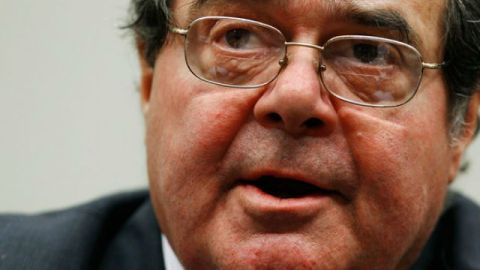Supreme Irony: Justice Scalia on Broccoli, Masturbation and the Constitution

If you followed the oral arguments before the Supreme Court during its impactful hearings on the 2010 Affordable Care Act, you’re aware that a particular green cruciferous vegetable factored heavily into Justice Antonin Scalia’s decision. During some of the exchanges, he questioned one of the attorneys about the justifiability of the law’s mandate that Americans buy health insurance.
What you may not know is that while Scalia apparently finds a law regulating the health insurance market to be horribly excessive, he thinks laws regulating fornication and masturbation represent a perfectly reasonable exercise of state power.
That’s right: Justice Scalia will defend your right to abstain from broccoli and from health insurance, but he won’t stand up for your right to pleasure yourself.
Hold the Broccoli
Let’s begin with Scalia’s line of questioning in March. Here is what he said to Attorney General Donald Verrilli on the second day of oral argument:
Could you define the market — everybody has to buy food sooner or later, so you define the market as food, therefore, everybody is in the market; therefore, you can make people buy broccoli.
Scalia didn’t come up with the broccoli analogy on his own. He grabbed it from conservative talk radio hosts and right-wing bloggers anxious to grease a slippery slope from the individual mandate down to forced purchases of leafy vegetables and gym memberships. If the government can compel you to buy health insurance to make the health insurance market more fair and workable for all, it can pull you kicking and screaming to the juice bar, or the gym, or a yoga studio. Can’t it?
Verrilli’s response was rambling and never quite got to the point, but Paul Krugman offers a clearer explanation:
When people choose not to buy broccoli, they don’t make broccoli unavailable to those who want it. But when people don’t buy health insurance until they get sick — which is what happens in the absence of a mandate — the resulting worsening of the risk pool makes insurance more expensive, and often unaffordable, for those who remain. As a result, unregulated health insurance basically doesn’t work, and never has.
When Scalia pressed the broccoli argument he spoke up for every American who wants to make his own decisions about how to live his life. He winked to carnivores and possibly to the elder President Bush, who hates broccoli more than anything. Scalia’s point was clear: the government exceeds constitutional limits when it interferes with individual, personal decisions.
Hold the Vibrators
Yet in his dissent in Lawrence v. Texas, a sexual freedom case from 2003, Scalia warned, presumably with a straight face, that overturning anti-sodomy laws spelled the demise of laws banning a number of sexual practices:
State laws against bigamy, same-sex marriage, adult incest, prostitution, masturbation, adultery, fornication, bestiality, and obscenity are likewise sustainable only in light of…validation of laws based on moral choices. Every single one of these laws is called into question by today’s decision; the Court makes no effort to cabin the scope of its decision to exclude them from its holding.
You might be asking yourself at this point: there were laws against masturbation? And Scalia opposed the decision in Lawrence because it might undermine the logic behind these laws?
Yes and yes. This slippery slope reasoning wasa significant part of Scalia’s view that anti-sodomy laws should be upheld. And while there are no laws prohibiting masturbation itself — a ban that would be ridiculously unenforceable, to say the least — there have been regulations aimed to curb onanism on the books in many states. Until 2008, Texas had a law banning the sale of sex toys. So did Alabama, Virginia and Mississippi. Even liberal Massachusetts (along with Georgia) prohibits something called “masturbation for hire,” presumably to deter masseuses from providing clients with anything more than a good clean massage. Many states legislate against variety of consensual sexual practices or “lewd and lascivious” behavior.
As it turns out, Scalia’s doomsday warning has come to pass. Texans and their southern neighbors are now free to buy vibrators, and we have the precedent in Lawrence v. Texas to blame for the travesty. Here is how the 5th U.S. Circuit Court of Appeals justified overturning the sex toy ban:
Just as in Lawrence, the state here wants to use its laws to enforce a public moral code by restricting private intimate conduct. The case is not about public sex. It is not about controlling commerce in sex. It is about controlling what people do in the privacy of their own homes because the state is morally opposed to a certain type of consensual private intimate conduct. This is an insufficient justification after Lawrence.
So far, incest, beastiality and polygamy are still no-nos.
Scalia’s Opportunistic Originalism
Why is Scalia opposed to a law regulating the insurance industry while fully supportive of the constitutionality of laws regulating private sexual conduct? He would tell you that the cases involve wholly different constitutional issues: Obamacare is about the limits of congressional power under the Commerce Clause of the Constitution, while laws concerning sexual morality are the legitimate province of the states. Absent a right to privacy or sexual intimacy — which Scalia calls a “total absurdity” — there is nothing in the Constitution to prevent states from discriminating on the basis of sexual orientation, and there is nothing to prevent them from banning sex toys or masturbation outright.
In his forthcoming book, previewed by Adam Liptak in the New York Times last week, Scalia claims to show that his judicial rulings have sometimes departed from his personal views. With allegiance to the original meaning of the constitutional text, Scalia presents himself as a neutral arbiter of every case that comes before him: the text alone decides.
But this originalism is not quite orthodox. Scalia admits there are times he deviates from the original meaning of the Constitution, and so he calls his judicial philosophy “faint-hearted originalism.” First, the principle of stare decisis — the Court’s tradition of respecting its prior decisions, most of the time — limits the extent to which a justice should overturn precedents based on an originalist understanding of the text. And second, if the original meaning of the text is too shocking to bear, it can be suppressed. Here is Scalia in a 1989 law review article:
What if some state should enact a new law providing public lashing, or branding of the right hand, as punishment for certain criminal offenses? Even if it could be demonstrated unequivocally that these were not cruel and unusual measures in 1791 [when the Eighth Amendment prohibition on “cruel and unusual punishment” was adopted], and even though no prior Supreme Court decision has specifically disapproved them, I doubt whether any federal judge — even among many who consider themselves originalists — would sustain them against an eighth amendment challenge.
This seemingly minor admission bespeaks a significant gap in Scalia’s jurisprudence and helps us make sense of the irony of his positions: substantive moral judgements are Scalia’s true guide. The Justice has no beef with laws curbing sexual conduct, but he’s dead-set against regulations of the health insurance market. The Constitution needs to step aside or be re-interpreted when its implications are untenable.
Follow Steven Mazie on Twitter: @stevenmazie





